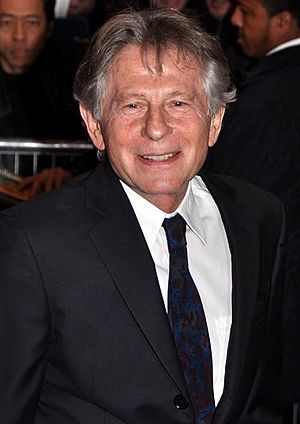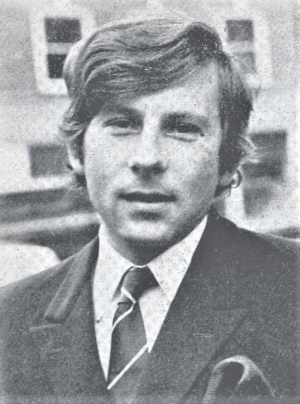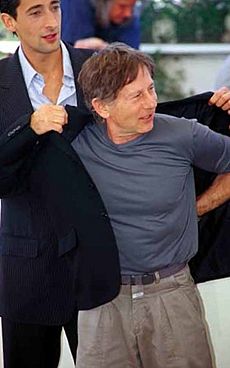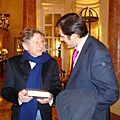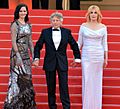Roman Polanski facts for kids
Raymond Roman Thierry Polański (born 18 August 1933) is a Polish and French filmmaker and actor. He has received many awards for his work, including an Academy Award, three British Academy Film Awards, and a Palme d'Or from the Cannes Film Festival.
Polanski's family moved from Paris to Kraków, Poland, in 1937. During World War II, his family was sent to the Kraków Ghetto. Polanski survived the Holocaust by living with foster families. In 1969, his pregnant wife, actress Sharon Tate, was tragically killed. In 1978, Polanski moved to Europe due to legal issues in the United States and has lived there ever since.
His first major film, Knife in the Water (1962), was nominated for an Academy Award for Best Foreign Language Film. He later directed successful English-language films like Repulsion (1965) and the horror classic Rosemary's Baby (1968). Other famous films include Chinatown (1974), Tess (1979), and The Pianist (2002), for which he won the Academy Award for Best Director.
Contents
Early Life and Education
Roman Polanski was born in Paris, France. His father, Mojżesz Liebling, was a Jewish painter from Poland. His mother, Bula Katz-Przedborska, was born in Russia to a Jewish father and a Catholic mother. She was raised in the Catholic faith. Polanski's parents were not religious, and Polanski later said he was an atheist.
Surviving World War II
In 1937, the Polański family moved back to Kraków, Poland. When World War II began, German forces occupied the city. The family was forced to live in the Kraków Ghetto, an area where Jewish people were confined. Polanski was only six years old and could not attend school for long.
His parents were taken away by German soldiers. His mother was sent to the Auschwitz concentration camp, where she died. His father was sent to the Mauthausen camp in Austria but survived. Polanski escaped the ghetto in 1943. He survived with the help of Polish Catholic families who hid him. He had to pretend to be Catholic to stay safe.
During the war, Polanski witnessed many terrible events. He later said these childhood experiences influenced the serious and tense feelings in his films. By the end of the war, about one-fifth of Poland's population had been killed.
Life After the War
After the war, Polanski was reunited with his father in Kraków. He remembered the villages where he stayed as being very simple, without electricity. He became fascinated with movies, which he saw as an escape. He loved everything about the cinema, from the bright screen to the mechanics of the projector.
He was especially inspired by the movie Odd Man Out (1947). He said it was one of the best films he had ever seen and that it made him want to become a director.
Career in Film
Polanski attended the famous National Film School in Łódź. He started as an actor in Polish films like Pokolenie (A Generation, 1954). He also began directing short films, which gained him recognition.
Breakthrough as a Director
Polanski's first full-length movie was Knife in the Water (1962). It was about a couple who take a hitchhiker on a boating trip. The film was a success and earned him his first Academy Award nomination. After this, he left Poland and moved to France, and then to England.
In England, he directed three films:
- Repulsion (1965): A psychological horror film about a young woman played by Catherine Deneuve.
- Cul-de-sac (1966): A dark comedy filmed in Northumberland.
- The Fearless Vampire Killers (1967): A comedy that makes fun of vampire movies. Polanski also acted in this film.
While making The Fearless Vampire Killers, he met American actress Sharon Tate. They married in London in 1968.
Hollywood Success
In 1968, Polanski directed Rosemary's Baby in Hollywood. The horror film was a huge box-office hit and made him a major director. It earned him another Academy Award nomination for his screenplay.
After the tragic death of his wife in 1969, Polanski continued to work. He directed a film version of Macbeth (1971) in England. He returned to Hollywood to direct Chinatown (1974), a mystery movie starring Jack Nicholson and Faye Dunaway. Chinatown is considered one of the greatest American films ever made. It was nominated for 11 Academy Awards.
His next film was The Tenant (1976), which he filmed in Paris and also starred in. This film, along with Repulsion and Rosemary's Baby, is part of what critics call his "Apartment Trilogy," as they all explore themes of isolation in city apartments.
Career in Europe
Polanski dedicated his next film, Tess (1979), to his late wife, Sharon Tate. She had suggested he read the book it was based on. The film starred Nastassja Kinski and was a critical and financial success. It won three Oscars and Polanski won Best Director at France's César Awards.
Over the next decades, Polanski directed many other films, including:
- Pirates (1986): A pirate adventure film starring Walter Matthau.
- Frantic (1988): A thriller starring Harrison Ford.
- Death and the Maiden (1994): A drama starring Ben Kingsley and Sigourney Weaver.
- The Ninth Gate (1999): A thriller starring Johnny Depp.
The Pianist and Later Films
In 2002, Polanski directed The Pianist. The film is based on the true story of Władysław Szpilman, a Polish-Jewish musician who survived the Holocaust in Warsaw. The story was very personal for Polanski because of his own childhood experiences.
The film was a huge success. It won the Palme d'Or at the Cannes Film Festival and earned Polanski the Academy Award for Best Director. He could not attend the ceremony in the U.S. but received a standing ovation.
His later films include:
- Oliver Twist (2005): An adaptation of the classic novel by Charles Dickens.
- The Ghost Writer (2010): A political thriller starring Ewan McGregor and Pierce Brosnan.
- Carnage (2011): A comedy starring Jodie Foster and Kate Winslet.
- An Officer and a Spy (2019): A historical drama about the Dreyfus affair in France.
In 2018, the Academy of Motion Picture Arts and Sciences removed Polanski from its membership.
Personal Life
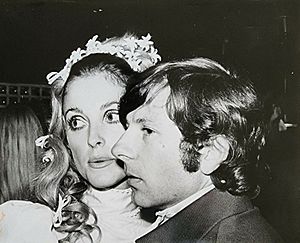
Polanski's first wife was Polish actress Barbara Kwiatkowska-Lass. They were married from 1959 to 1962.
He married actress Sharon Tate in 1968. In August 1969, while Polanski was in Europe, Tate, who was eight months pregnant, was murdered in their Los Angeles home by members of the Manson Family cult. Polanski has called her death the most significant event in his life.
In 1989, Polanski married French actress Emmanuelle Seigner. They have two children, a daughter named Morgane and a son named Elvis.
Filmography
| Year | Title | Distribution |
|---|---|---|
| 1962 | Knife in the Water | Zespół Filmowy "Kamera" |
| 1965 | Repulsion | Compton Films |
| 1966 | Cul-de-sac | Compton-Cameo Films |
| 1967 | The Fearless Vampire Killers | Metro-Goldwyn-Mayer |
| 1968 | Rosemary's Baby | Paramount Pictures |
| 1971 | Macbeth | Columbia Pictures |
| 1972 | What? | NPF Planfilm |
| 1974 | Chinatown | Paramount Pictures |
| 1976 | The Tenant | |
| 1979 | Tess | Columbia Pictures |
| 1986 | Pirates | The Cannon Group, Inc. |
| 1988 | Frantic | Warner Bros. |
| 1992 | Bitter Moon | Fine Line Features |
| 1994 | Death and the Maiden | |
| 1999 | The Ninth Gate | BAC Films / Araba Films |
| 2002 | The Pianist | Focus Features |
| 2005 | Oliver Twist | Pathé |
| 2010 | The Ghost Writer | StudioCanal UK |
| 2011 | Carnage | Sony Pictures Classics |
| 2013 | Venus in Fur | BAC Films |
| 2017 | Based on a True Story | |
| 2019 | An Officer and a Spy | Gaumont / 01 Distribution |
| 2023 | The Palace | 01 Distribution |
Awards and Nominations
Polanski's films have won many awards. Here is a summary of nominations and wins at major award ceremonies.
| Year | Title | Academy Awards | BAFTA Awards | Golden Globe Awards | |||
|---|---|---|---|---|---|---|---|
| Nominations | Wins | Nominations | Wins | Nominations | Wins | ||
| 1962 | Knife in the Water | 1 | 1 | ||||
| 1968 | Rosemary's Baby | 2 | 1 | 1 | 4 | 1 | |
| 1974 | Chinatown | 11 | 1 | 11 | 3 | 7 | 4 |
| 1979 | Tess | 6 | 3 | 3 | 1 | 4 | 2 |
| 2002 | The Pianist | 7 | 3 | 7 | 2 | 2 | |
| Total | 27 | 8 | 23 | 6 | 17 | 7 | |
Images for kids
-
Polanski's star on the Łódź walk of fame
See also
 In Spanish: Roman Polanski para niños
In Spanish: Roman Polanski para niños
 | Selma Burke |
 | Pauline Powell Burns |
 | Frederick J. Brown |
 | Robert Blackburn |


